formerly eScholarship Editions


|
|
|
|
Your search for
'Intellectual History' in subject
found 61 book(s). | Modify Search | Displaying 21 - 40 of 61 book(s) | |
| 21. | 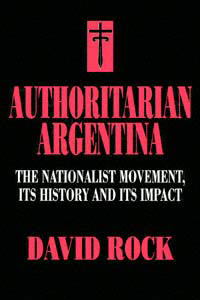 | Title: Authoritarian Argentina: the Nationalist movement, its history, and its impact Author: Rock, David 1945- Published: University of California Press, 1993 Subjects: History | Latin American Studies | Latin American History | Intellectual History Publisher's Description: David Rock has written the first comprehensive study of nationalism in Argentina, a fundamentalist movement pledged to violence and a dictatorship that came to a head with the notorious "disappearances" of the 1970s. This radical, right wing movement has had a profound impact on twentieth-century Ar . . . [more] Similar Items |
| 22. | 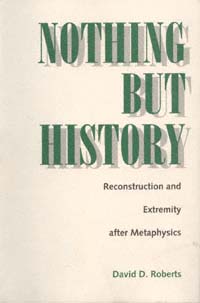 | Title: Nothing but history: reconstruction and extremity after metaphysics Author: Roberts, David D 1943- Published: University of California Press, 1995 Subjects: History | Intellectual History | Social and Political Thought Publisher's Description: What is the role of history in our "postmetaphysical" age? Surveying two centuries of philosophical writing, David Roberts offers a thoughtful guide to the philosophy of history before the recent challenges associated with deconstructive postmodernism. He then argues for a moderate intellectual tradition in which historical knowledge, although freed from transcendent values, continues to play a crucial role in the conduct of human affairs.Roberts's careful account of historicism explores the ideas of its major nineteenth-century representatives and foils, including Hegel, Dilthey, and Nietzsche. His thorough consideration of such twentieth-century thinkers as Gadamer, Croce, Foucault, and Heidegger contributes vitally to the ongoing discussions about the use and abuse of history. Certain to engage historians and philosophers, this book will interest scholars across the humanities who are concerned with the present and future utility of historical thinking. [brief] Similar Items |
| 23. | 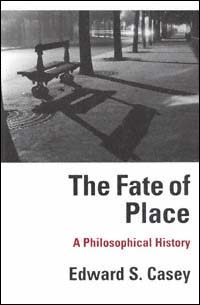 | Title: The fate of place: a philosophical history Author: Casey, Edward S 1939- Published: University of California Press, 1997 Subjects: Philosophy | Classical Philosophy | Architecture | Intellectual History | Geography Publisher's Description: In this imaginative and comprehensive study, Edward Casey, one of the most incisive interpreters of the Continental philosophical tradition, offers a philosophical history of the evolving conceptualizations of place and space in Western thought. Not merely a presentation of the ideas of other philosophers, The Fate of Place is acutely sensitive to silences, absences, and missed opportunities in the complex history of philosophical approaches to space and place. A central theme is the increasing neglect of place in favor of space from the seventh century A.D. onward, amounting to the virtual exclusion of place by the end of the eighteenth century.Casey begins with mythological and religious creation stories and the theories of Plato and Aristotle and then explores the heritage of Neoplatonic, medieval, and Renaissance speculations about space. He presents an impressive history of the birth of modern spatial conceptions in the writings of Newton, Descartes, Leibniz, and Kant and delineates the evolution of twentieth-century phenomenological approaches in the work of Husserl, Merleau-Ponty, Bachelard, and Heidegger. In the book's final section, Casey explores the postmodern theories of Foucault, Derrida, Tschumi, Deleuze and Guattari, and Irigaray. [brief] Similar Items |
| 24. | 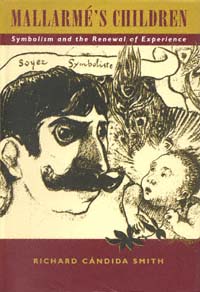 | Title: Mallarmé's children: symbolism and the renewal of experience Author: Smith, Richard Cándida Published: University of California Press, 2000 Subjects: History | Intellectual History | Art | European Studies | Literature Publisher's Description: In a narrative gracefully combining intellectual and cultural history, Richard Cándida Smith unfolds the legacy of Stéphane Mallarmé (1842-1898), the poet who fathered the symbolist movement in poetry and art. The symbolists found themselves in the midst of the transition to a world in which new media devoured cultural products and delivered them to an ever-growing public. Their goal was to create and oversee a new elite culture, one that elevated poetry by removing it from a direct relationship to experience. Instead, symbolist poetry was dedicated to exploring discourse itself, and its practitioners to understanding how language shapes consciousness.Cándida Smith investigates the intellectual context in which symbolists came to view artistic practice as a form of knowledge. He relates their work to psychology, especially the ideas of William James, and to language and the emergence of semantics. Through the lens of symbolism, he focuses on a variety of subjects: sexual liberation and the erotic, anarchism, utopianism, labor, and women's creative role. Paradoxically, the symbolists' reconfiguration of elite culture fit effectively into the modern commercial media. After Mallarmé was rescued from obscurity, symbolism became a valuable commodity, exported by France to America and elsewhere in the market-driven turn-of-the-century world. Mallarmé's Children traces not only how poets regarded their poetry and artists their art but also how the public learned to think in new ways about cultural work and to behave differently as a result. [brief] Similar Items |
| 25. | 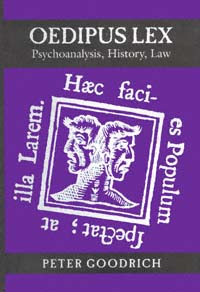 | Title: Oedipus lex: psychoanalysis, history, law Author: Goodrich, Peter 1954- Published: University of California Press, 1995 Subjects: Philosophy | Social and Political Thought | Law | Intellectual History Publisher's Description: Oedipus Lex offers an original and evocative reading of legal history and institutional practice in the light of psychoanalysis and aesthetics. It explores the unconscious of law through a wealth of historical and contemporary examples. Peter Goodrich provides an anatomy of law's melancholy and boredom, of addiction to law, of legal repressions, and the aesthetics of jurisprudence. He retraces the genealogy of law and invokes the failures and exclusions - the poets, women, and outsiders - that legal science has left in its wake.Goodrich analyzes the role and power of the image of law and details the history of law's plural jurisdictions and traditions of resistance to law. He explores mechanisms of repression and representation as constituents of modern subjectivity, using long-abandoned medieval texts and early appearances of feminism as resources for the understanding and renewal of legal scholarship. Not simply deconstruction but also reconstruction, this work is keenly attuned to the discontinuties, silences, and gaps in the cultural tradition called law. [brief] Similar Items |
| 26. | 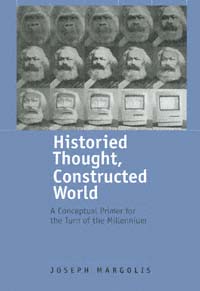 | Title: Historied thought, constructed world: a conceptual primer for the turn of the millennium Author: Margolis, Joseph 1924- Published: University of California Press, 1995 Subjects: Philosophy | Social and Political Thought | Intellectual History Publisher's Description: Historied Thought, Constructed World offers a fresh vision: one that engages the reigning philosophies of the West, endorses the radical possibilities of historicity and flux, and reconciles the best themes of Anglo-American and continental European philosophy. Margolis sketches a program for the philosophy of the future, addressing topics such as the historical character of thinking, the intelligible world as artifact, the inseparability of theory and practice, and the reliability of a world without assured changeless structures.Through the use of numbered theorems that construct an interlocking argument, Margolis carefully articulates his distinctive ideas in the context of work by Quine, Davidson, Putnam, Rorty, Derrida, Habermas, and Foucault. The discussion includes all the central topics of the philosophical tradition: from science to morality, from language to world, from persons to objects, from nature to culture, from causality to purpose, from change to history. What emerges is an argument against essentialism, one that champions the historicity of thought and cultural constructionism. [brief] Similar Items |
| 27. | 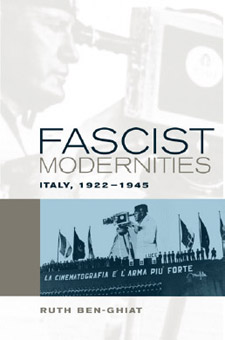 | Title: Fascist modernities: Italy, 1922-1945 Author: Ben-Ghiat, Ruth Published: University of California Press, 2001 Subjects: European Studies | History | Intellectual History | European History Publisher's Description: Ruth Ben-Ghiat's innovative cultural history of Mussolini's dictatorship is a provocative discussion of the meanings of modernity in interwar Italy. Eloquent, pathbreaking, and deft in its use of a broad range of materials, this work argues that fascism appealed to many Italian intellectuals as a new model of modernity that would resolve the contemporary European crisis as well as long-standing problems of the national past. Ben-Ghiat shows that - at a time of fears over the erosion of national and social identities - Mussolini presented fascism as a movement that would allow economic development without harm to social boundaries and national traditions. She demonstrates that although the regime largely failed in its attempts to remake Italians as paragons of a distinctly fascist model of mass society, twenty years of fascism did alter the landscape of Italian cultural life. Among younger intellectuals in particular, the dictatorship left a legacy of practices and attitudes that often continued under different political rubrics after 1945. [brief] Similar Items |
| 28. | 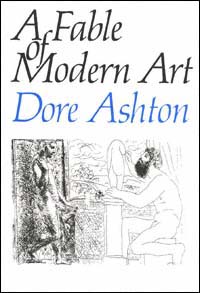 | Title: A fable of modern art Author: Ashton, Dore Published: University of California Press, 1991 Subjects: Art | Art History | Art Theory | Intellectual History Publisher's Description: Dore Ashton's masterly analysis of modern art grows out of a consideration of Balzac's brilliant and little known 'philosophic' story The Unknown Masterpiece in which the concerns of Cézanne, Picasso, and the abstract expressionists are strikingly prefigured. Balzac's fable is discussed not only within the context from which it emerged - early nineteenth-century romanticism - but also in its embodiment of various attitudes towards art. Ashton illuminates a web of associations linking Balzac to Cézanne, Rilke, Schoenberg, Kandinsky and Picasso as they struggle with the yearning to express the inexpressible, to make concrete the abstract.As Professor Ashton develops the conjectures of her book she reveals the interrelations of literature, music, and art and the basic problems which engage or beset the contemporary artist and those who seek to understand and appreciate contemporary art. This is a book of extreme originality which ranges so widely and offers such valuable insights that it forms an important contribution not only to the history of art and culture, but also to the history of ideas. [brief] Similar Items |
| 29. | 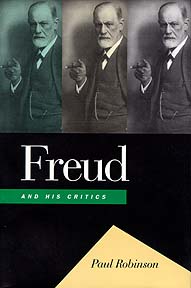 | Title: Freud and his critics Author: Robinson, Paul A 1940- Published: University of California Press, 1993 Subjects: History | Intellectual History | Autobiographies and Biographies | Psychology | Psychiatry Publisher's Description: Wars against Freud have been waged along virtually every front during the past decade. Now Paul Robinson takes on three of Freud's most formidable critics, mounting a thoughtful, witty, and ultimately devastating critique of the historian of science Frank Sulloway, the psychoanalyst Jeffrey Masson, and the philosopher Adolf Grünbaum.Frank Sulloway contends that Freud took most of his ideas from Darwin and other contemporary thinkers - that he was something of a closet biologist. Jeffrey Masson charges that Freud caved in to peer pressure when he abandoned his early seduction theory (which Masson believes was correct) in favor of the theory of infantile sexuality. Adolf Grünbaum impugns Freud's claim to have grounded his ideas - especially the idea of the unconscious - on solid empirical foundations.Under Robinson's rigorous cross-examination, the evidence of these three accusers proves ambiguous and their arguments biased by underlying assumptions and ideological commitments. Robinson concludes that the anti-Freudian writings of Sulloway, Masson, and Grünbaum reveal more about their authors' prejudices - and about the Zeitgeist of the past decade - than they do about Freud.Beautifully crafted and full of surprises, Robinson's work is a compelling defense of one of history's most original and powerful minds. Freud and His Critics will earn an enduring place in the raging Freudian debate. [brief] Similar Items |
| 30. | 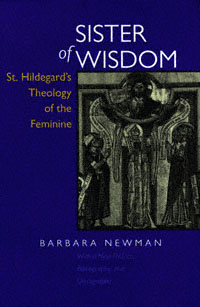 | Title: Sister of wisdom: St. Hildegard's theology of the feminine Author: Newman, Barbara 1953- Published: University of California Press, 1998 Subjects: History | Religion | Gender Studies | Women's Studies | Intellectual History | Medieval Studies Publisher's Description: Barbara Newman reintroduces English-speaking readers to an extraordinary and gifted figure of the twelfth-century renaissance. Hildegard of Bingen (1098-1179) was mystic and writer, musician and preacher, abbess and scientist who used symbolic theology to explore the meaning of her gender within the . . . [more] Similar Items |
| 31. | 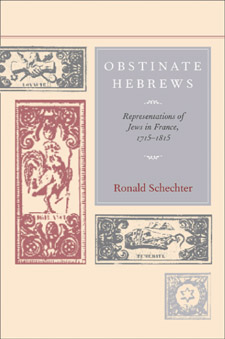 | Title: Obstinate Hebrews: representations of Jews in France, 1715-1815 Author: Schechter, Ronald Published: University of California Press, 2003 Subjects: History | European History | Jewish Studies | Intellectual History | French Studies Publisher's Description: Enlightenment writers, revolutionaries, and even Napoleon discussed and wrote about France's tiny Jewish population at great length. Why was there so much thinking about Jews when they were a minority of less than one percent and had little economic and virtually no political power? In this unusually wide-ranging study of representations of Jews in eighteenth-century France - both by Gentiles and Jews themselves - Ronald Schechteroffers fresh perspectives on the Enlightenment and French Revolution, on Jewish history, and on the nature of racism and intolerance. Informed by the latest historical scholarship and by the insights of cultural theory, Obstinate Hebrews is a fascinating tale of cultural appropriation cast in the light of modern society's preoccupation with the "other." Schechter argues that the French paid attention to the Jews because thinking about the Jews helped them reflect on general issues of the day. These included the role of tradition in religion, the perfectibility of human nature, national identity, and the nature of citizenship. In a conclusion comparing and contrasting the "Jewish question" in France with discourses about women, blacks, and Native Americans, Schechter provocatively widens his inquiry, calling for a more historically precise approach to these important questions of difference. [brief] Similar Items |
| 32. | 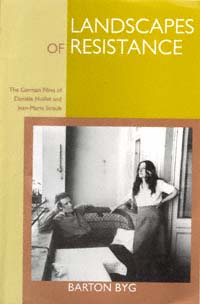 | Title: Landscapes of resistance: the German films of Danièle Huillet and Jean-Marie Straub Author: Byg, Barton 1953- Published: University of California Press, 1995 Subjects: Cinema and Performance Arts | Film | German Studies | Intellectual History Publisher's Description: Fervently admired and frequently reviled, Jean-Marie Straub and Danièle Huillet - who have lived and worked together for almost forty years - may well be the most uncompromising, not to say intransigent, filmmakers in the history of the medium. Their radical and deeply political films placed them as forerunners of the New German Cinema movement in the 1960s and influential figures in the subsequent explosion of the European avant-garde. In Landscapes of Resistance , Barton Byg fills a significant gap in modern German and European cinema studies by tracing the career of the two filmmakers and exploring their connection to German modernism, in particular their relationship to the Frankfurt School.Although they are not German themselves, Straub and Huillet have used German material as the basis for the majority of their films. They have transcribed prose by Böll and Kafka, operas by Schoenberg, and verse dramas by Holderlin. Byg explores how their work engages German culture with a critical distance and affection and confronts the artificiality of divisions between high and low culture. [brief] Similar Items |
| 33. | 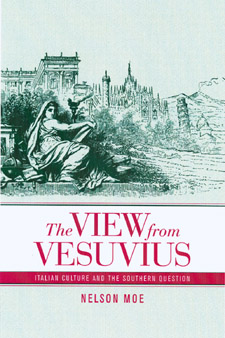 | Title: The view from Vesuvius: Italian culture and the southern question Author: Moe, Nelson 1961- Published: University of California Press, 2002 Subjects: European Studies | European History | Intellectual History | Politics | European Literature Publisher's Description: The vexed relationship between the two parts of Italy, often referred to as the Southern Question, has shaped that nation's political, social, and cultural life throughout the twentieth century. But how did southern Italy become "the south," a place and people seen as different from and inferior to the rest of the nation? Writing at the rich juncture of literature, history, and cultural theory, Nelson Moe explores how Italy's Mezzogiorno became both backward and picturesque, an alternately troubling and fascinating borderland between Europe and its others. This finely crafted book shows that the Southern Question is far from just an Italian issue, for its origins are deeply connected to the formation of European cultural identity between the mid-eighteenth and late nineteenth centuries. Moe examines an exciting range of unfamiliar texts and visual representations including travel writing, political discourse, literary texts, and etchings to illuminate the imaginative geography that shaped the divide between north and south. His narrative moves from a broad examination of the representation of the south in European culture to close readings of the literary works of Leopardi and Giovanni Verga. This groundbreaking investigation into the origins of the modern vision of the Mezzogiorno is made all the more urgent by the emergence of separatism in Italy in the 1990s. [brief] Similar Items |
| 34. | 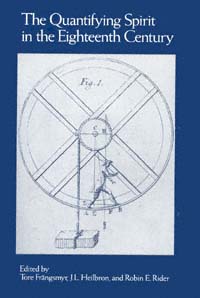 | Title: The Quantifying spirit in the 18th century Author: Frängsmyr, Tore 1938- Published: University of California Press, 1990 Subjects: Science | History and Philosophy of Science | Intellectual History Similar Items |
| 35. | 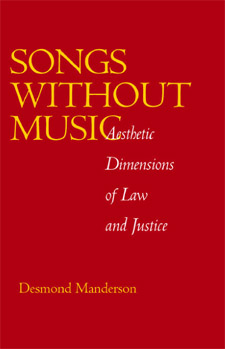 | Title: Songs without music: aesthetic dimensions of law and justice Author: Manderson, Desmond Published: University of California Press, 2000 Subjects: Law | Philosophy | Ethics | Social and Political Thought | Intellectual History Publisher's Description: In this pathbreaking and provocative analysis of the aesthetics of law, the historian, legal theorist, and musician Desmond Manderson argues that by treating a text, legal or otherwise, as if it were merely a sequence of logical propositions, readers miss its formal and symbolic meanings. Creatively using music as a model, he demonstrates that law is not a sterile, rational structure, but a cultural form to be valued and enhanced through rhetoric and metaphors, form, images, and symbols. To further develop this argument, the book is divided into chapters, each of which is based on a different musical form. Law, for Manderson, should strive for neither coherence nor integrity. Rather, it is imperfectly realized, constantly reinterpreted, and always in flux. Songs without Music is written in an original, engaging, and often humorous style, and exhibits a deep knowledge of both law and music. It successfully traverses several disciplines and builds an original and persuasive argument for a legal aesthetic. The book will appeal to a broad readership in law, political theory, literary criticism, and cultural studies. [brief] Similar Items |
| 36. | 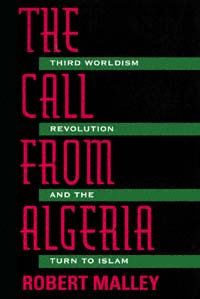 | Title: The call from Algeria: third worldism, revolution, and the turn to Islam Author: Malley, Robert 1963- Published: University of California Press, 1996 Subjects: Politics | History | Middle Eastern Studies | Islam | Intellectual History | African Studies Publisher's Description: The speed with which Algeria has gone from symbol of revolutionary socialism to Islamic battleground has confounded most observers. Charting Algeria's political evolution from the turn of the century to the present, Robert Malley explores the historical and intellectual underpinnings of the current crisis. His analysis helps makes sense of the civil war that is tearing Algeria apart.Using contemporary Algerian politics as a case study of the intellectual movement labeled "Third Worldism," Malley's thoughtful analysis also elucidates the broader transformations affecting countries of the Third World that once embraced ideologies of state-centered radical change. Malley focuses on the interplay between politics, economics, and ideology to explain the rise, essential components, and precipitous decline of Third Worldism - a movement that attracted scholars and activists in both the developed and underdeveloped worlds from the mid 1950s to the mid 1980s. He relates the disillusionment with Third Worldism to the growing appeal in the Third World of economic liberalism, versions of political pluralism, and ideological movements that threaten the very existence of the central state.At a time when the public increasingly is associating countries of the less developed world with Islamism, tribalism, and ethnic warfare, The Call from Algeria challenges our assumptions and offers a new perspective. [brief] Similar Items |
| 37. | 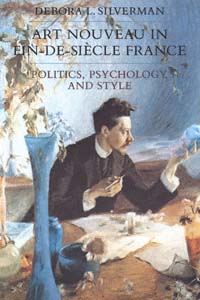 | Title: Art nouveau in fin-de-siècle France: politics, psychology, and style Author: Silverman, Debora Leah Published: University of California Press, 1989 Subjects: History | Art History | French Studies | European History | Intellectual History Similar Items |
| 38. | 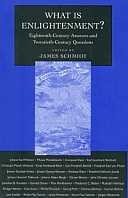 | Title: What is Enlightenment?: eighteenth-century answers and twentieth-century questions Author: Schmidt, James Published: University of California Press, 1996 Subjects: Philosophy | Social and Political Thought | Intellectual History | German Studies Publisher's Description: This collection contains the first English translations of a group of important eighteenth-century German essays that address the question, "What is Enlightenment?" The book also includes newly translated and newly written interpretive essays by leading historians and philosophers, which examine the origins of eighteenth-century debate on Enlightenment and explore its significance for the present.In recent years, critics from across the political and philosophical spectrum have condemned the Enlightenment for its complicity with any number of present-day social and cultural maladies. It has rarely been noticed, however, that at the end of the Enlightenment, German thinkers had already begun a scrutiny of their age so wide-ranging that there are few subsequent criticisms that had not been considered by the close of the eighteenth century. Among the concerns these essays address are the importance of freedom of expression, the relationship between faith and reason, and the responsibility of the Enlightenment for revolutions.Included are translations of works by such well-known figures as Immanuel Kant, Moses Mendelssohn, Johann Gottlieb Fichte, and Johann Georg Hamann, as well as essays by thinkers whose work is virtually unknown to American readers. These eighteenth-century texts are set against interpretive essays by such major twentieth-century figures as Max Horkheimer, Jürgen Habermas, and Michel Foucault. [brief] Similar Items |
| 39. | 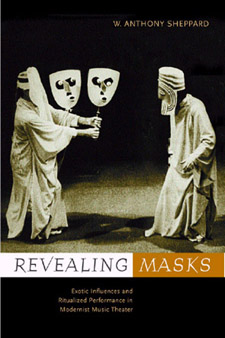 | Title: Revealing masks: exotic influences and ritualized performance in modernist music theater Author: Sheppard, William Anthony 1969- Published: University of California Press, 2001 Subjects: Music | American Music | Contemporary Music | Ethnomusicology | Opera | Musicology | Intellectual History Publisher's Description: W. Anthony Sheppard considers a wide-ranging constellation of important musical works in this fascinating exploration of ritualized performance in twentieth-century music. Revealing Masks uncovers the range of political, didactic, and aesthetic intents that inspired the creators of modernist music theater. Sheppard is especially interested in the use of the "exotic" in techniques of masking and stylization, identifying Japanese Noh, medieval Christian drama, and ancient Greek theater as the most prominent exotic models for the creation of "total theater." Drawing on an extraordinarily diverse - and in some instances, little-known - range of music theater pieces, Sheppard cites the work of Igor Stravinsky, Benjamin Britten, Arthur Honegger, Peter Maxwell Davies, Harry Partch, and Leonard Bernstein, as well as Andrew Lloyd Webber and Madonna. Artists in literature, theater, and dance - such as William Butler Yeats, Paul Claudel, Bertolt Brecht, Isadora Duncan, Ida Rubenstein, and Edward Gordon Craig--also play a significant role in this study. Sheppard poses challenging questions that will interest readers beyond those in the field of music scholarship. For example, what is the effect on the audience and the performers of depersonalizing ritual elements? Does borrowing from foreign cultures inevitably amount to a kind of predatory appropriation? Revealing Masks shows that compositional concerns and cultural themes manifested in music theater are central to the history of twentieth-century Euro-American music, drama, and dance. [brief] Similar Items |
| 40. | 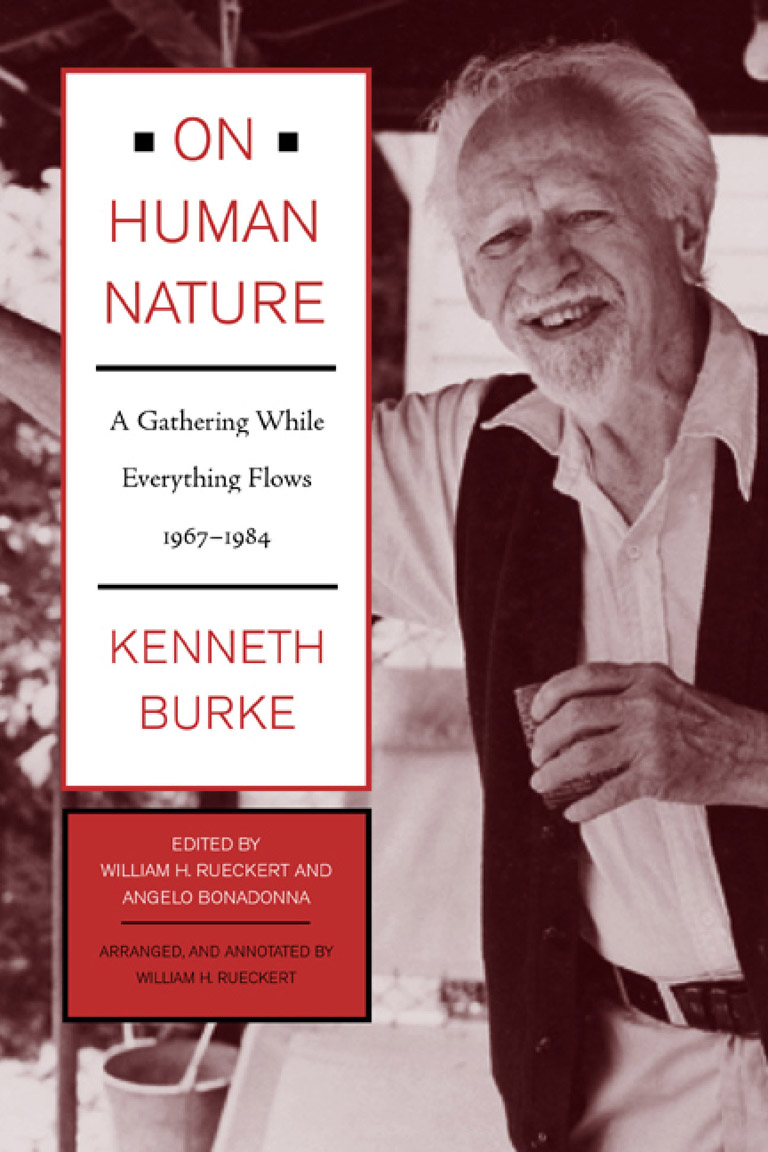 | Title: On human nature: a gathering while everything flows, 1967-1984 Author: Burke, Kenneth 1897- Published: University of California Press, 2003 Subjects: Literature | Literary Theory and Criticism | Intellectual History | Rhetoric | Comparative Literature Publisher's Description: On Human Nature: A Gathering While Everything Flows brings together the late essays, autobiographical reflections, an interview, and a poem by the eminent literary theorist and cultural critic Kenneth Burke (1897-1993). Burke, author of Language as Symbolic Action, A Grammar of Motives, and Rhetoric of Motives, among other works, was an innovative and original thinker who worked at the intersection of sociology, psychology, literary theory, and semiotics. This book, a selection of fourteen representative pieces of his productive later years, addresses many important themes Burke tackled throughout his career such as logology (his attempt to find a universal language theory and methodology), technology, and ecology. The essays also elaborate Burke's notions about creativity and its relation to stress, language and its literary uses, the relation of mind and body, and more. Provocative, idiosyncratic, and erudite, On Human Nature makes a significant statement about cultural linguistics and is an important rounding-out of the Burkean corpus. [brief] Similar Items |